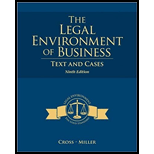
The Legal Environment of Business: Text and Cases
9th Edition
ISBN: 9781305764460
Author: Frank B Cross/ Roger LeRoy Miller
Publisher: CENGAGE C
expand_more
expand_more
format_list_bulleted
Question
Chapter 3, Problem 4CT
Summary Introduction
Case summary:In a limited
To explain:The ethical duty of RW to comply with the defendant’s discovery request.
Expert Solution & Answer
Want to see the full answer?
Check out a sample textbook solution
Students have asked these similar questions
What type of account is 'Unearned Revenue'?A) AssetB) LiabilityC) EquityD) Revenueexplain
Please provide the answer to this financial accounting question using the right approach.
Financial Accounting
Chapter 3 Solutions
The Legal Environment of Business: Text and Cases
Knowledge Booster
Similar questions
- I am looking for a reliable way to solve this financial accounting problem using accurate principles.arrow_forwardWhat type of account is 'Unearned Revenue'?A) AssetB) LiabilityC) EquityD) Revenuearrow_forwardK. Decker, S. Rosen, and E. Toso are forming a partnership. Decker is transferring $47,200 of personal cash to the partnership. Rosen owns land worth $19,200 and a small building worth $79,600, which she transfers to the partnership. Toso transfers to the partnership cash of $13,800, accounts receivable of $36,400, and equipment worth $16,200. The partnership expects to collect $32,760 of the accounts receivable.arrow_forward
arrow_back_ios
SEE MORE QUESTIONS
arrow_forward_ios
Recommended textbooks for you
 BUSN 11 Introduction to Business Student EditionBusinessISBN:9781337407137Author:KellyPublisher:Cengage Learning
BUSN 11 Introduction to Business Student EditionBusinessISBN:9781337407137Author:KellyPublisher:Cengage Learning Essentials of Business Communication (MindTap Cou...BusinessISBN:9781337386494Author:Mary Ellen Guffey, Dana LoewyPublisher:Cengage Learning
Essentials of Business Communication (MindTap Cou...BusinessISBN:9781337386494Author:Mary Ellen Guffey, Dana LoewyPublisher:Cengage Learning Accounting Information Systems (14th Edition)BusinessISBN:9780134474021Author:Marshall B. Romney, Paul J. SteinbartPublisher:PEARSON
Accounting Information Systems (14th Edition)BusinessISBN:9780134474021Author:Marshall B. Romney, Paul J. SteinbartPublisher:PEARSON
 International Business: Competing in the Global M...BusinessISBN:9781259929441Author:Charles W. L. Hill Dr, G. Tomas M. HultPublisher:McGraw-Hill Education
International Business: Competing in the Global M...BusinessISBN:9781259929441Author:Charles W. L. Hill Dr, G. Tomas M. HultPublisher:McGraw-Hill Education

BUSN 11 Introduction to Business Student Edition
Business
ISBN:9781337407137
Author:Kelly
Publisher:Cengage Learning

Essentials of Business Communication (MindTap Cou...
Business
ISBN:9781337386494
Author:Mary Ellen Guffey, Dana Loewy
Publisher:Cengage Learning

Accounting Information Systems (14th Edition)
Business
ISBN:9780134474021
Author:Marshall B. Romney, Paul J. Steinbart
Publisher:PEARSON


International Business: Competing in the Global M...
Business
ISBN:9781259929441
Author:Charles W. L. Hill Dr, G. Tomas M. Hult
Publisher:McGraw-Hill Education
